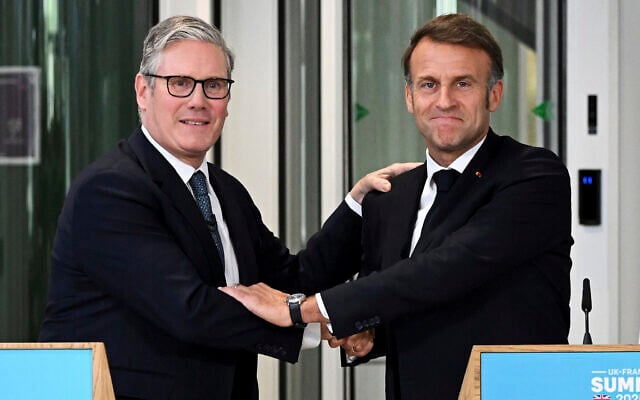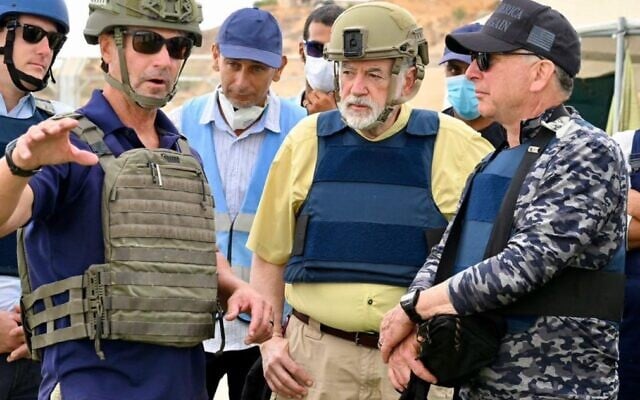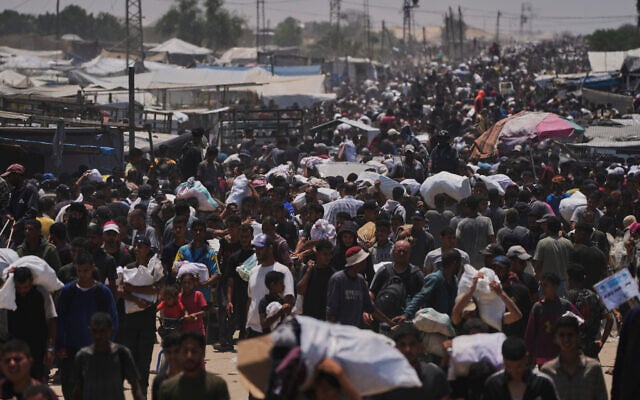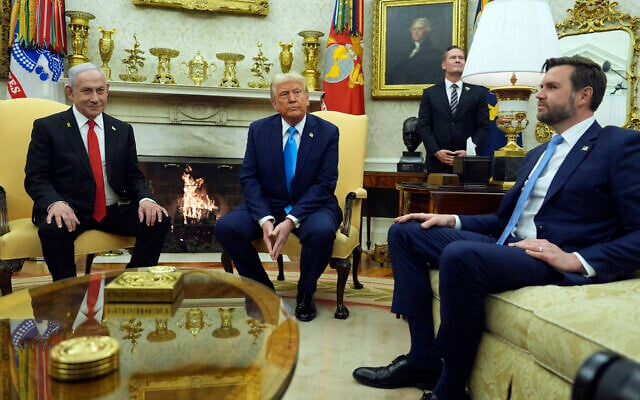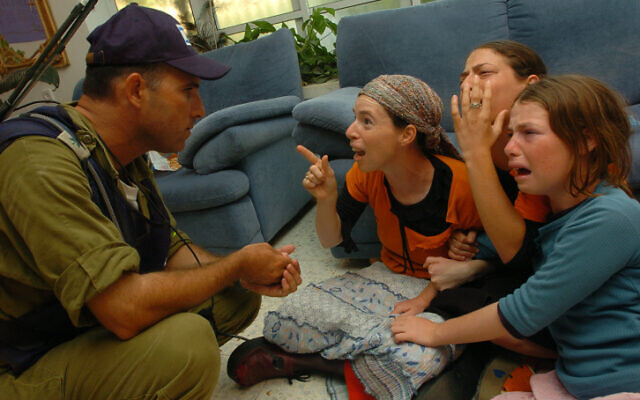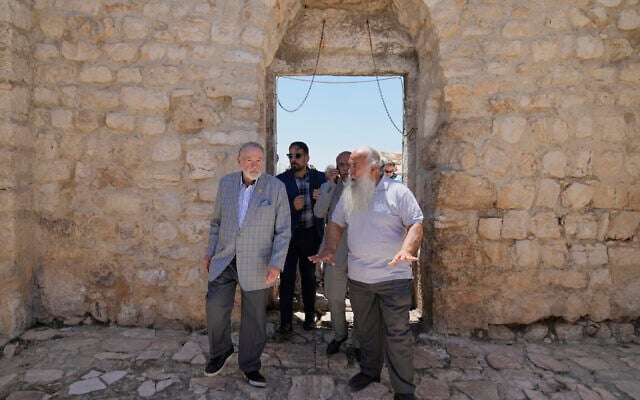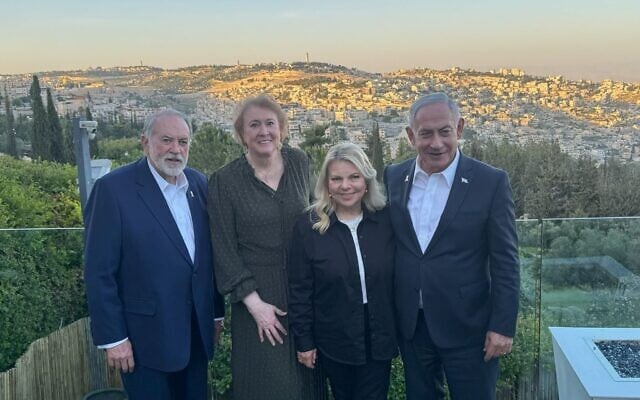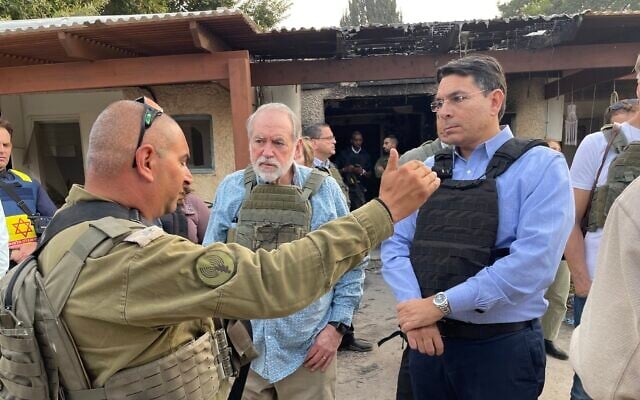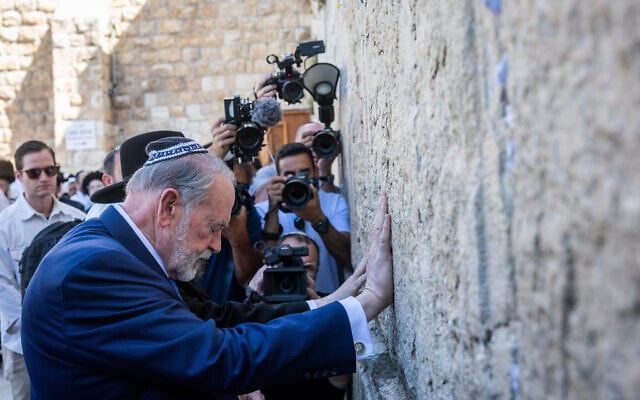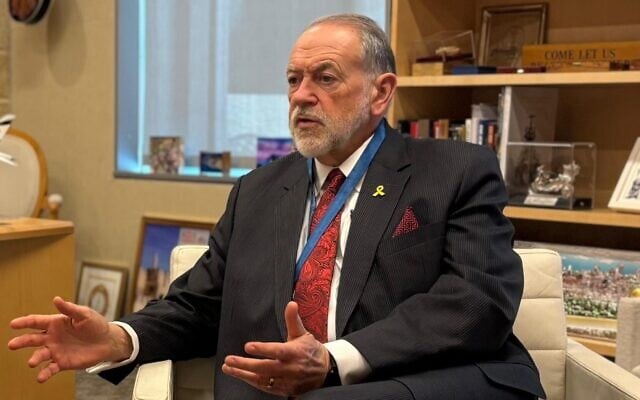


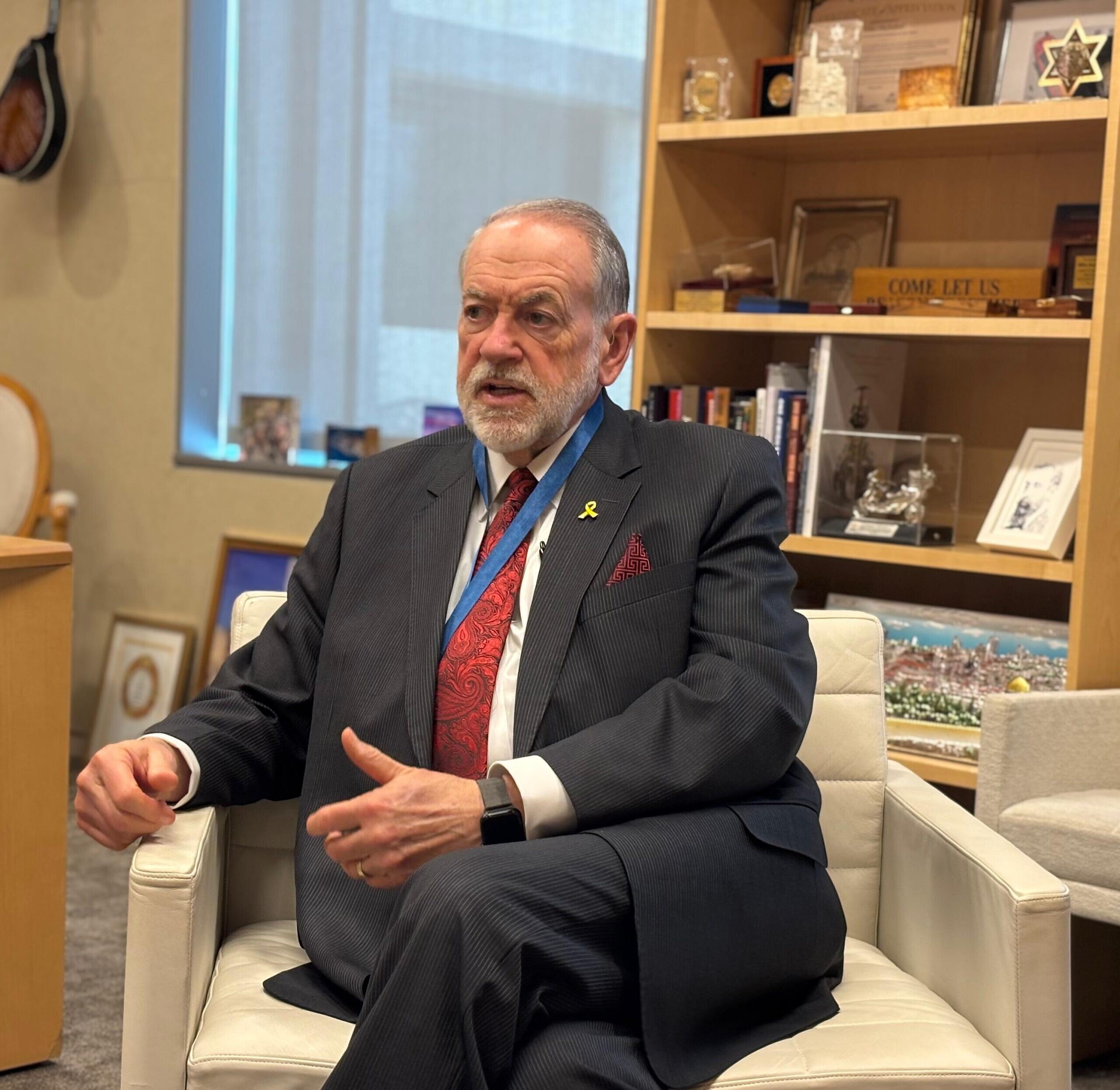
Excerpts from this interview were sent out earlier Wednesday in ToI’s weekly update email to members of the Times of Israel Community. To receive these Editor’s Notes as they’re released, join the ToI Community here.
As Israel, since the Hamas invasion and massacre on October 7, 2023, endures the most difficult period in its modern history, Mike Huckabee — Baptist minister, former Arkansas governor, would-be US president and, since April, US ambassador to Israel — has been a prominent and unstinting champion of its multifront battles against Hamas, Iran and others, and emphatically, against presidents and prime ministers, UN and other global forums, activists and commentators who would criticize it.
In an interview with the Times of Israel on Tuesday, Huckabee similarly gave short shrift to almost any suggestion that aspects of Israel’s policies and actions in Gaza, as it has sought to destroy Hamas and bring home all the hostages, might have been ill-conceived, much less indefensible, as almost all world leaders and many Israelis have increasingly come to allege.
“I think it’s fair if you want to second-guess decisions that were made,” he allowed at only one point, when asked about the 11 weeks between March and May when Israel did not allow aid into Gaza. But he immediately elaborated that Israel had allowed vast quantities of aid into Gaza previously, and that there would have been plenty available had Hamas not stolen it, and that Israel was trying every tactic it could find to try to push the obdurate, monstrous Hamas into a ceasefire-hostage deal.
And he was furiously denunciative of Western countries, including the UK and France, for their recently declared plans to unilaterally recognize a Palestinian state. You should handle disagreements with your friends “through some diplomatic channel, with some circumspection,” he said. “You don’t join with and aid and abet [Israel’s] sworn adversaries, those who are trying to kill them, who literally are trying to kill them.”
Huckabee also highlighted what he stressed was his personal belief that Israel’s fate is determined by factors beyond geopolitical considerations, arguing that given 3,800 years of history, “you could only describe this country as a country that God’s hand is upon. There’s no other explanation.” And he talked passionately about the “unique and special” resilience of the Jewish people and of Israel. These two factors, he indicated, left him less worried than, for example, his interviewer, about the direction and destiny of the country.
Huckabee was a cordial interviewee, generous with his time, and spoke with great conviction. The following transcript of our conversation has been edited for clarity and brevity.
The Times of Israel: It seems that almost all of the world has turned against Israel, incredibly, since October the seventh, with the exception of the United States. How worried are you, as somebody who loves this country, who is the ambassador here, for the very future survival of Israel?
Mike Huckabee: I’m not as worried about its survival, because I feel like there is something bigger with Israel’s survival than any geopolitical consideration. But I’m worried very much that people who claim to be a part of Western civilization do not see their connection to Israel.
It should be pretty obvious to them that there is a value system upon which Israel is founded, the same value system upon which the United States was founded, and quite frankly, the same value system that most of the European nations are supposedly founded upon. So what has happened to them? I don’t understand it, and it’s a head-scratcher for me.
Maybe they distinguish between Israel, the state, the country, the people, and Israel, the government. And they are saying, the British, the French — you’re hearing this, and you’re responding to it — we can’t be supportive of this government; it is doing terrible things; we were very sympathetic after October the seventh, but the behavior since is unacceptable.
To that, I would say, look, it’s perfectly acceptable to be in disagreement with the policies of any government, whether it’s the Brits or the French or whatever. I regularly disagree with some of those governments. But I wouldn’t turn my back on them when they’re under siege. You don’t do that to friends. You just don’t do that to your friends.
And if you do have a disagreement with them, you bring it to them quietly. You don’t hang them out to dry in a public forum. You don’t join with and aid and abet their sworn adversaries, those who are trying to kill them, who literally are trying to kill them. You would pursue that through some diplomatic channel, with some circumspection.
You don’t go and make some profound decision that you’re going to unilaterally recognize a Palestinian state — which is in and of itself provocative, but even more so in light of the fact that Hamas is holding hostages and is celebrating these announcements. Secretary [of State] Rubio said last weekend, which I thought was quite accurate, that those public declarations by the French and the Brits [about intending to recognize Palestine] ended negotiations with Hamas. Just destroyed it. That was it. That was the end of it. Because they looked at it and said, “We’re winning. This is great. The result of October seventh is going to be a Palestinian state.”
Israel has tried vigorously to find a way to break loose the logjam and to get the hostages out. And they’ve tried a lot of different things. They’ve tried going soft. They’ve tried going hard
Didn’t Israel, the government, to some extent give propaganda weapons to Hamas? I’m thinking most especially about the 11 weeks that Israel did not allow aid into Gaza, and argued that there was sufficient aid, and has since acknowledged that there wasn’t access everywhere that it was needed, at the very least. And President Trump has said he sees starvation. Didn’t the government, with some of these policies — and the US allowed Israel to do it — make it easier for people to demonize and delegitimize Israel?
I think it’s fair if you want to second-guess decisions that were made. But let’s be fair. Israel allowed an enormous level of humanitarian aid to go in before the 11-week period. There would have been plenty of food going in had Hamas not stolen it, warehoused it, kept it for themselves, and then turned around and sold it for profit in the black market. So, to blame Israel for that?
Israel, at that time, was hoping that that would push Hamas [into a deal]. Let’s keep in mind, Israel has tried vigorously to find a way to break loose the logjam and to get the hostages out. And they’ve tried a lot of different things. They’ve tried going soft. They’ve tried going hard. They’ve tried holding back food. They’ve tried pouring, as they have, 2 million tons of food in.
I back up and look at the big picture, and I’m asking somebody to give me an answer: When in the history of the world has a country that was attacked been held responsible for the feeding of the country that attacked them?
I can’t find a time, ever. I can’t find that the Brits were expected to feed Germany during the height of World War II, or that the US was expected to feed Japan in 1944. I don’t see that, whether it was the Mexican-American War in 1836…
Gaza was turned by Hamas into a terrorist state, where Israel can’t fight that war without harming the people that Hamas has deliberately placed in harm’s way. It complicates everything. But surely Israel can’t afford to let those people be destroyed, even if it’s their government that put them in that situation?
Here’s the question, though. Why are they in that situation? They voted Hamas into power in 2007. Israel pulled completely out. They turned it into a complete Palestinian state. I’m not blaming the civilians. I’m sure they regret their vote. When I talked to some of them when I was down there, they very much want Hamas out of there. They hate Hamas.
How widespread do you think that sentiment is? I mean, you had a small glimpse [when visiting Gaza with US Middle East special envoy Steve Witkoff on August 1].
I can’t say I did a scientific poll.
But your sense?
The passion with which they spoke was pretty surprising to me. Here was the surprise. They hate Hamas. They want nothing to do with them for their future. They hate the PLO, the PA, and Fatah. They don’t hate the IDF, which was a surprise. I would have figured that they would have seen them as the oppressor. They didn’t. They love the US, which I liked.
These were a few people that you met that day at the GHF [the US-backed Gaza Humanitarian Foundation] site?
Yeah, these were mostly well-educated people, people that had owned businesses.
What was striking about the people that I spoke with…: Every single one of them had a family member who had been murdered by Hamas
How is it that you met with them? They had arranged beforehand? It wasn’t people who just happened to turn up that day?
I saw a few people more randomly at the GHF feeding site. And they were grateful. English was not the primary language for them, so it was a little more difficult to communicate. There were some that did [speak English], that were working at the site. They were very protective of their identity because of the fear of retribution.
But what was striking about the people that I spoke with, the ones that spoke good English, they had a pretty good command of things, and were very well-read, intelligent, and had a broad perspective: Every single one of them had a family member who had been murdered by Hamas. They all had some experiences of the violence that had been inflicted [by Hamas] — not toward the IDF, but toward their own civilian population. Either they went for food, or they were in the way. They described a very vicious Hamas. Unrelenting.
Let’s talk about the site that you went to and the GHF operations. I don’t know the degree to which America was involved in setting up GHF…
Totally involved. It was our setup. It was an American project.
Almost every day for weeks, we were told, vast numbers of people were killed. Not always confirmed. We don’t know who by. The army acknowledged opening fire in some cases. I stress, we’re not in Gaza — The Times of Israel, we go in when the army lets us. But vast numbers of people killed every day.
That’s not true. I can categorically tell you.
“A thousand people have been killed.”
It did not happen.
Tell me what you think are the true facts. Over these weeks of apparent huge numbers of deaths.
There, without a doubt, were deaths that happened in the outer perimeter. There may have been single-digit deaths, where someone was close to [a site]. I can’t tell you that there was a death of a civilian at a GHF site.
Why did Hamas hate GHF so much? Because it was messing up the business that they had
Maybe I misconstructed the sentence. I’m not charging “at the sites themselves.” I’m talking about people trying to get aid, trying to get to those sites, close to those sites.
I think there were many who were killed by Hamas, which vehemently objected to the GHF. This is one of the questions I posed to Piers Morgan last night when I talked to him: Why did Hamas hate GHF so much? Why did they demand, in one of the iterations of the negotiation, that they would not move any further [in the talks], that the second most important thing to them was eliminating GHF as a distribution — why? Because it was messing up the business that they had.
Otherwise, why would they care? Wouldn’t they want the food, if they were really all about humanitarian efforts? So to me, it was very telling.
There was one particular day. It was early on in GHF [operations], probably the second, third week. There was a report that went viral. New York Times, BBC, CNN, Washington Post all ran with it. That 27 people had been killed at a GHF feeding site. Not one person was killed. Not one person was injured. Wasn’t even close. It was an absolute 100% fabricated story. We pushed back hard on it. We demanded retractions. We got what you might expect, some editing of the story. Some even said, We cannot verify.
And I appreciate your saying a moment ago, can’t verify. I have people who are down there every single day. We get daily reports of: How many people were fed? How many people came? And were there any incidences? And I’m telling you, categorically, there have not been these mass shootings at these distribution sites.
At or near?
Well, it depends on how near. Now, did somebody get killed on the way? It could have happened. It’s a hot war zone. And Hamas is brutally dealing with anyone that they think they might find to be a problem to them.
So yeah, civilians getting killed. There’s no doubt about that. There’s suffering and deprivation. I’ve never doubted that. But I just want to make sure that we put the blame where it belongs. I don’t think the US gets blamed for it. We’re trying to feed people. I don’t think it’s fair to blame Israel exclusively.
Have there been instances where maybe people were shot by IDF soldiers? Best I can tell, that has happened, but here’s what typically has precipitated it: You have a group of, let’s say, 10 or 15 IDF soldiers. They’re manning a perimeter. You have 2,000 or 3,000 people who suddenly are rushing toward a position. They’re first given a verbal warning. Please stop. Second thing they get, shots fired in the air. Third thing, shots fired at the ground. And if they’re still rushing toward them, it’s probable that some people are shot in the midst of that because [the soldiers] don’t know why they’re coming. Are they coming to overrun the position?
It’s very unfortunate that the Israeli army is doing crowd control around food sites and doesn’t have non-lethal means.
Who should do it? What we have at the GHF sites are contractors. They’re armed. These are Special Forces veterans from the US. So these are highly trained Special Forces people that have served mostly in Iraq and Afghanistan. But they’re prepared to use lethal force if necessary.
Are you saying you don’t need the Israeli army deployed in the way that they are, nearish [to the sites]?
No, we need them in the outer perimeters to create the [access] corridors.
I just wish there were non-lethal crowd control methods [being used].
Don’t we all?
We do have them.
What are you going to do? Get Girl Scouts to take them in?
The government has announced that the war is to expand, and it talks about going into Gaza City as though the Israeli army has not operated in Gaza City before. But it’s been there many times. Rafah was [ostensibly] the last stronghold that had to fall [for the war to end], and then Rafah was taken over, but the war didn’t end. Why do you think that the expanded war is going to be more successful than 22 months of fighting so far?
I don’t know that it will or won’t. That’s not an ambassador’s position, to evaluate another government’s decision.
But the president is supportive.
The president has said, and he’s right about this, that Israel has a right to defend itself in the way that it deems best to save it. He made the comment, I think yesterday, I believe. He said, Remember October the seventh. But I don’t think the president has taken a side on the strategy or the tactics and said, Yep, or no. He has respected the fact that Israel is a sovereign nation, makes its own decisions, and that would be the embassy’s position as well. We don’t jump in the middle of it.
The president in February said, We’re going to make all Gazans leave. We’re going to relocate them. They should go to somewhere that’ll be wonderful for them. We’ll take it over. Then he moved back a little from that in terms of, not forced relocation but encouraging the relocation [of Gazans].
I don’t recall that he said “forced” ever.
When he was with Netanyahu in February… (Trump spoke in the Oval Office of all Gazans leaving, and not returning.)
I was going through Senate confirmation.
But he’s not saying that now. He’s [since been] saying “encouraging them,” and Israel is encouraging them.
What I’ve heard from the president is: people that want to leave should be able to, but they shouldn’t be displaced involuntarily. I’ve heard the same thing from the Israelis.
You don’t use the term “West Bank,” but rather Judea and Samaria, and the heartland of Jewish biblical history is indeed in Judea and Samaria…
Eighty percent of the Bible is Judea and Samaria.
But if you look between the river and the sea, and it all becomes Israeli, then this country either is no longer a majority Jewish state or it messes with its democracy to artificially preserve that majority. The founding principle of the modern state is a Jewish, democratic country, and we managed it, and we have managed it. If we are forever entrenched and entangled in the West Bank and Gaza, those foundations are at risk.
Well, I wouldn’t say Israel is entrenched in Gaza. They gave it away in 2005, wholly. One of the most moving things I ever saw was the film [of the forced evacuation] at the Museum at Gush Katif. It was painful to watch that.
I think the American position has to be that we aren’t going to try to dictate how this works out. We have an ally, we have a partner in Israel. We also care about the people who live in Judea and Samaria, whether they’re Palestinian or whether they’re Israeli.
When we have an American citizen who is murdered, as we did a little over a month ago, we demand a full investigation. We want to know who did it. We want them to be consequenced. I went to the home of the family whose son was murdered, met with that family, and we continue to follow that investigation, as we should.
You met not too long ago with the deputy head of the Palestinian Authority, Hussain Al-Sheikh.
And Prime Minister Mustafa. And last week or the week before, I went back and met with a group of Palestinian business leaders.
We have an ally, we have a partner in Israel. We also care about the people who live in Judea and Samaria, whether they’re Palestinian or whether they’re Israeli
So what role do you see for the PA — in the West Bank, in Gaza? Can there be no role for the PA in Gaza? Is that not an American decision to make?
Yes, it’s not an American decision to make. It’s probably going to be a decision in some measure for the people who live there to make. Again, I don’t have a scientific poll, but they were not amenable, the ones that I spoke to [in Gaza], about Fatah, the PLO, the PA, being their governing body. What I have heard more, and the president mentioned this, is an international consortium that would include Saudi Arabia, Egypt, Jordan, UAE — kind of a governing council, and appoint someone to lead that.
With a US role at all?
I would imagine the US would have a role, but I think it would be really more of the lead of those countries.
But those countries won’t do it without some ostensibly legitimate Palestinian, PA, role, they’re saying.
That may be what they’re saying. I haven’t heard that, so I don’t know.
How do you and the administration see the war ending? And how do you see postwar Gaza?
Let me quote the president: Hamas has no future there, and they can’t stay. That has been very consistent from President Trump from the beginning. I appreciate his clarity and his consistency.
It was the same with Iran. Anyone who doubted what the US was going to do, they just weren’t paying attention. They might listen to a dozen other people who claimed to be speaking for the US. But when it came to President Trump, it was crystal clear.
Leaving Hamas there, letting them have a role in its future, is like leaving Nazis in Germany and saying, Yeah, you can go ahead and maybe run the place
As it relates to Gaza, he’s been crystal clear. Hamas doesn’t have a role. They can’t stay. I say, leaving them there, letting them have a role in its future, is like leaving Nazis in Germany and saying, “Yeah, you can go ahead and maybe run the place. You have to give Holland back.” Nobody would believe that was legit.
But how do we get to that? Again, it’s not your responsibility to fix it for us, but we depend on this partnership with you. And between the two of us, how do we get to that? We’ve been going for 22 months. Almost the whole world hates Israel. Jews around the world are feeling pressured, by the way, divided. And the war goes on.
For one thing, I don’t think all of the anti-Semitism around the world is directly related to Gaza. I think that there is something more sinister. It’s more about the global left, who has decided that they’re going to pick a person to demonize, and they’ve picked Israel. I don’t have to tell you. Jews have been hunted and hated for millennia. It’s irrational. It’s an irrational hate. It makes no sense to me. I say that as a non-Jew. But it’s part of the reason that I feel so strongly that it’s incumbent upon the rest of us to be supportive of the Jewish people and supportive of Israel, because they have been chased all over the world for 2,000 years, actually for 4,000 years or 3,800.
But it has certainly soared, from right after October the seventh, which, of course, confirms your point that it was always there. But it’s now reached levels I didn’t think that I would see in my lifetime.
I was hoping I wouldn’t.
The sliver of hope that I see is from an odd place, the Arab League
I did not think that Big Ben would have “From the river to the sea” projected on it. The question is, how do we solve this? Deny them the latest pretext, but also solve the problem that there’s Hamas in Gaza, and Hamas will, of course, revive and threaten us again.
The sliver of hope that I see is from an odd place, the Arab League. The very week that the French and the Brits were calling for unilateral recognition of a Palestinian state, the Arab League unanimously voted for two things: one, that Hamas must disarm, and two, let all the hostages go at once.
And I thought, Am I seeing what I’m seeing? That the people that we thought would be on the side of Israel have basically, for all practical purposes, taken Hamas’s side. And the people that one might think would be on the side of Hamas are actually recognizing that Israel is the attacked, the victims, and demanding that it’s Hamas that step down, step aside, and let the hostages go. There are a lot of things that are weird in this world right now, and that’s one of them.
These European countries that are lining up to reward Hamas by recognizing Palestine — you’d say that, right?
Yeah. Inadvertently or not, that’s what they’re doing.
Is the administration going to do anything about that? Is it going to try and punish them in some way?
I don’t know. I can’t announce that because it’s not my decision to make. I don’t get to make the medicine. I just dispense it at the counter like a good pharmacist.
You think they should?
Again, I don’t get to have that opinion. I wish I did. It’s not that I don’t have one, David. It’s just that sometimes I have to restrain myself.
You rightly highlighted the left. On the right, too, there is antisemitism.
Yeah.
Within part of the base that elected President Trump, there is a dissent over Israel, greater criticism of Israel. That base is not as solid as it was on Israel.
Yeah. I don’t think it’s widespread.
Maybe even in the evangelical movement.
I think it’s still pretty solid in the evangelical world. It’s not widespread. But where it is beginning to show a difference is in the younger generation. And that’s worrisome to me. I don’t think that among the president’s base, there’s widespread divergence from the long-standing support of Israel. It’s just that the voices who are saying it are very, very loud. And they’re getting a lot of attention, a lot of clicks on the internet.
President Trump’s support for Israel is rock solid?
Absolutely.
And his support for this Israeli government? He would support everything that the Israeli government would do?
Well, of course not. Any more than they would support everything he does. I mean, there’s an incredible bond between the president and the prime minister. Deeply personal, but it’s also professional. By professional, I mean that their relationship is strong enough that they can disagree with each other. They don’t have to make sure it’s okay if I think this or say this. And that goes both ways. I think that’s the healthy relationship in a democracy that one would hope for.
I wouldn’t tell you that they agree on everything, but I have seen up close, personal and firsthand that I can’t imagine two world leaders being any closer in terms of their ability to speak to each other with candor, frankness, and encouragement. And it doesn’t mean that the prime minister agrees with everything President Trump says or does, or that the president agrees with everything the prime minister says or does. Good friends disagree.
And the octopus at the heart of the anti-Israel front, in Iran: We had this war, and America participated, and we set the Iranians back a fair deal. Israel underestimated how strategic a threat the ballistic missiles were, never mind the nuclear program. I don’t see that situation stabilizing with this regime in Iran. Is that your sense?
They don’t seem to have learned a whole lot from the good whipping they got. But it’s going to take them a long time to get back to where they were. I would like to think that one thing they may have learned is that if the president of the United States, Donald J. Trump, says something to them, they may not like it, but they would be wise to listen. He kept telling them, We’ll negotiate up to a point. We’re going to give you all the time in the world to come to some understanding. But he told them, You’re not going to have a nuclear weapon, and you’re not going to enrich uranium. I think they just blew it off. Didn’t think it was going to really result in something. And turns out it did.
And by the same token, he’s saying to Hamas, I will not pressure Israel to end this war, you guys are not going to survive this war, you either give up or you will be killed. Is that his message to Hamas?
I don’t know if it’s those exact words, but he certainly said, They’re not going to stay. They’re not going to have any role, and that Israel has a right to defend itself against the horrific attacks of October the seventh.
I was in Kfar Aza while the blood was still on the floor and the walls, and the bullet holes were still fresh, and the stench was still there. And that’s after some of it had been cleaned up, and it was still the most horrific thing
I always try to remind people what happened, because it seems like people forget, and I don’t want them to forget. I don’t want anyone to ever forget what happened. I was here just a few weeks after it, and I talked to people who survived it. I talked to family members who had loved ones who didn’t. I was in Kfar Aza while the blood was still on the floor and the walls, and the bullet holes were still fresh, and the stench was still there. And that’s after some of it had been cleaned up, and it was still the most horrific thing.
I’ve seen the 47-minute video that was made by Hamas. People tend to forget that. I did a Piers Morgan show last night, and afterwards they had some other guy, and he said, Well, those things didn’t really happen. Well, actually, they did. And we have video evidence of it. So it’s not like I just wrote this as a piece of fiction.
I don’t want people to ever forget that women were raped in front of their own children and then mutilated, and that babies were beheaded and burned in ovens [DH — initial reports on some of these claims have been challenged and/or debunked], and that old people got set afire in a wheelchair. There are things that happened, as we all know. Unspeakable horrors. It was bad enough that they murdered people, but they massacred people, and then they mutilated them, to add insult to the injury, and inflicted upon them not only physical pain, but the deepest level of emotional and spiritual and humiliating horrors that they could possibly do. Did it intentionally and did it gleefully. That’s what I pray the world doesn’t forget.
As an Israeli, we’re all attached to some degree or another to people who died, and to people who are doing military service, and all utterly tied up with this. Much of the world felt the same, for some time after October seventh. Not all. Much of the world is now saying, You have reduced this terror state, but with its 2 million people, to almost complete rubble. You haven’t destroyed Hamas. You’ve lost the legitimacy that you had in the aftermath of that horrible Hamas massacre, unprecedented since the Holocaust. That’s the situation that we’re in now.
The reason [the war] has gone on, the reason Gaza has been reduced to a rubble, is because of the stubbornness and the just pure villainous nature of Hamas, that doesn’t care that the people that it’s supposed to take care of have been killed. In fact, they were the ones who herded them together on the targets that Israel announced it was going to hit
I would say that Israel would have loved for this to have been over October the eighth. The ninth would have been almost as good. The end of October of ’23 would have been good. The reason it has gone on, the reason Gaza has been reduced to a rubble, is because of the stubbornness and the just pure villainous nature of Hamas, that doesn’t care that the people that it’s supposed to take care of have been killed. In fact, they were the ones who herded them together on the targets that Israel announced it was going to hit.
What other country has ever done that? Israel said, We’re going to hit this place. Get everybody out of there. What does Hamas do? They herd them in and put them in front of the military targets.
Yes, a lot of people have died. It’s horrific. But I don’t for a minute think that Israel has enjoyed 22 months of this. They would much rather have had it been over 21 months ago. They would much rather have had all of the hostages released long before now. And I totally object to those who say, Yeah, the government wants this to keep going. They don’t want it to end.
I think that that’s not only unfair, untrue, but it’s the kind of lie that is utterly baseless. And I’ll tell you why. Sitting in the prime minister’s cabinet, there are people who are more invested in this than most Americans will ever understand, and maybe most Israelis even know. Ron Dermer has two sons in Gaza right now. Ambassador [to the US Yechiel] Leiter had a son killed in Gaza. There are other high-level ministers in the Prime Minister’s Office who either have children there right now or they have been there in this war. To say that they wanted it to go on is beyond unconscionable.
But the fact is, from within the negotiating team, you have heard for months and months and months people saying, Hey, the chance is there to do the deal now. We should do the deal now.
They have tried. They have made concessions, the likes of which the public doesn’t know. The US has been, as you know, very vitally involved in these discussions. And every time they get to a point where they think, Oh, it’s about to happen, it’s going to be a breakthrough, Hamas moves the goalpost. They change the rules. They add something. They take away something.
When Witkoff got up and walked away and said, They’re not serious, they don’t want this to end, he wasn’t talking about the Israelis. He was talking about Hamas
This is why two weeks ago, [US Middle East special] envoy Steve Witkoff got up, walked away, and said, They’re not serious. Now, here’s a guy who’s been involved in these discussions since January, immensely involved. If anybody has some credibility to be able to say where the negotiations are, it would be envoy Witkoff. But when he got up and walked away and said, They’re not serious, they don’t want this to end, he wasn’t talking about the Israelis. He was talking about Hamas.
Part of the reason why there’s such skepticism is that there are core parties in this coalition that would bring down the government if Netanyahu were to end the war. You have the security people saying, This is the time. Why aren’t you doing it? And you have the far right saying, We’ll bring you down if you do it.
It’s a very interesting matter, Israeli politics. I tell people back in the US all the time. I say, If you think our politics is divisive, come over here and watch what it really looks like. It’s tough, but it’s tough everywhere. Political skirmishes and differences are intense. Everybody wants to take their own spoon and their own spice into the kitchen and stir the soup and add what they think would make it a better flavor. If everybody gets to take the spoon and the spice, probably the soup is not edible. Sometimes that’s what government ends up with — something that won’t work because you try to accommodate everybody, and it doesn’t always work out.
I want to come back to the very first thing you referred to, as a final question: Your personal view of Israel as extraordinary, as not like other countries, as blessed by God, and therefore certain to survive. Maybe that’s not a fair summation?
There’s two dimensions to that. Geopolitically, I can’t make that statement. From a standpoint of looking at the history of the past 3,800 years, you could only describe this country as a country that God’s hand is upon. There’s no other explanation.
I’ve seen it with my own eyes for 52 years since I first started coming here in 1973. So my history here is remembering what this country was when I first came. It was a sleepy little place that barely could survive. People were living on kibbutzim and living socialistically because it was about the only way to make it. Go to the Old City on a Friday and camels and sheep and goats and herds were still running around. It was a very different country then.
Tel Aviv was a little bit more bustling than maybe Jerusalem was at that time, but it certainly wasn’t the startup nation and the center of technology that changed the world. And the desert was just that. It was the desert. And now you drive anywhere, in the Judean desert. And what once was nothing but rocks and dirt are now forests, farms, groves, orchards. Stunning, meticulously cared for and feeding the world. It’s just a remarkable change.
The economy is capitalistic. It’s robust. Honestly, I look at the economy of Israel in the midst of now what’s been almost a two-year, ongoing war, and it’s amazing that it’s still as vibrant as it is.
I think God helps those who help themselves. I don’t know the divine will. I see a country with serious, grave threats externally and tearing itself apart from within. And I don’t think we can rely on “You’re a special place, God has a plan for you.” I worry about where this country is headed.
I think it’s fair to worry… There is a human connection in all of this. I’m not denying that. But I look at the US in the same way. There’s no explanation for why we should have survived our revolution in 1776. We had merchants and farmers that were grabbing the muskets off their mantels. Those muskets were designed to hunt varmints, not take on the best-equipped, best-trained, best-dressed army in the world. And yet we did. And we won a war we shouldn’t have won, and we’ve thrived.
I can’t explain it any other way than that there were people on their knees praying that somehow they could give their children and grandchildren a place to live in liberty. And I see Israel in somewhat the same way.
People have made the greatest sacrifices of their own lives in order to create a country where Jews could come and have a place to be safe. And as Golda Meir so brilliantly said in 1973, when they asked her after the Yom Kippur war, what’s Israel’s secret weapon? And she said, We have nowhere else to go.
It’s a lasting reminder to me that there is something about the resilience of the Jewish people as a whole and the Israeli people, specifically, that is incredibly unique and special.
I meet Palestinians all the time who don’t hate Israel and don’t hate the Israelis. And many that I know want prosperity for their families. They want peace. They want a future
And the future of the Palestinians is a function of their willingness to accept that legitimacy for the Jews?
I meet Palestinians all the time who don’t hate Israel and don’t hate the Israelis. And many that I know want prosperity for their families. They want peace. They want a future.
For the people that say, well, it’s an apartheid state, Israel. I’m thinking, really? How come you have Arab people in the Knesset? Arabs who run very successful businesses, who are doctors, who are lawyers, who serve on the Supreme Court, one of whom was a judge that actually sentenced the president to jail. That’s hardly apartheid. That doesn’t happen in an apartheid state.
And to say that Israel is genocidal, I think that’s the most ridiculous thing ever. As I’ve said to many people in interviews, if Israel is genocidal, they’re not real good at it. They’re terrible at it. They could have ended everyone in Gaza in one day if they wanted to. If that was their goal, they could have done that.
It’s a mess down there. My gosh, it’s horrible. I just want to remind everybody it’s horrible because Hamas did an unspeakable horror on October the seventh, and they refused to answer for it and refused to give up their aspirations to keep doing it.
And they keep saying, if they survive, they will do it again and again and again. They feel like that it has been maybe even worth it if out of it comes a Palestinian state. Well, it’s pretty disturbing to hear that — that they think that all of the deaths and all of the destruction and the mayhem would be worth it. And I’m stunned that somebody would think that that’s okay, to believe that.

